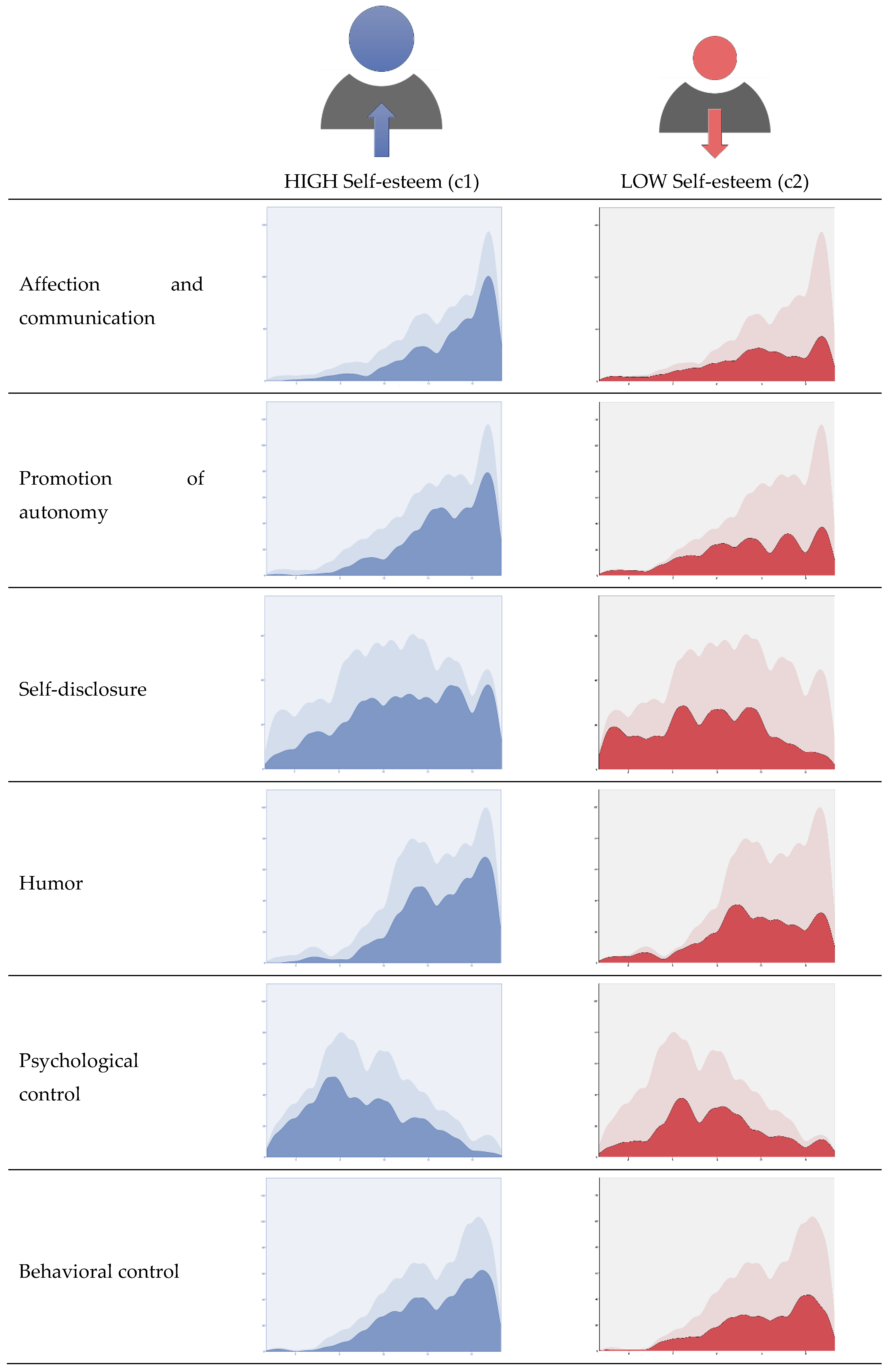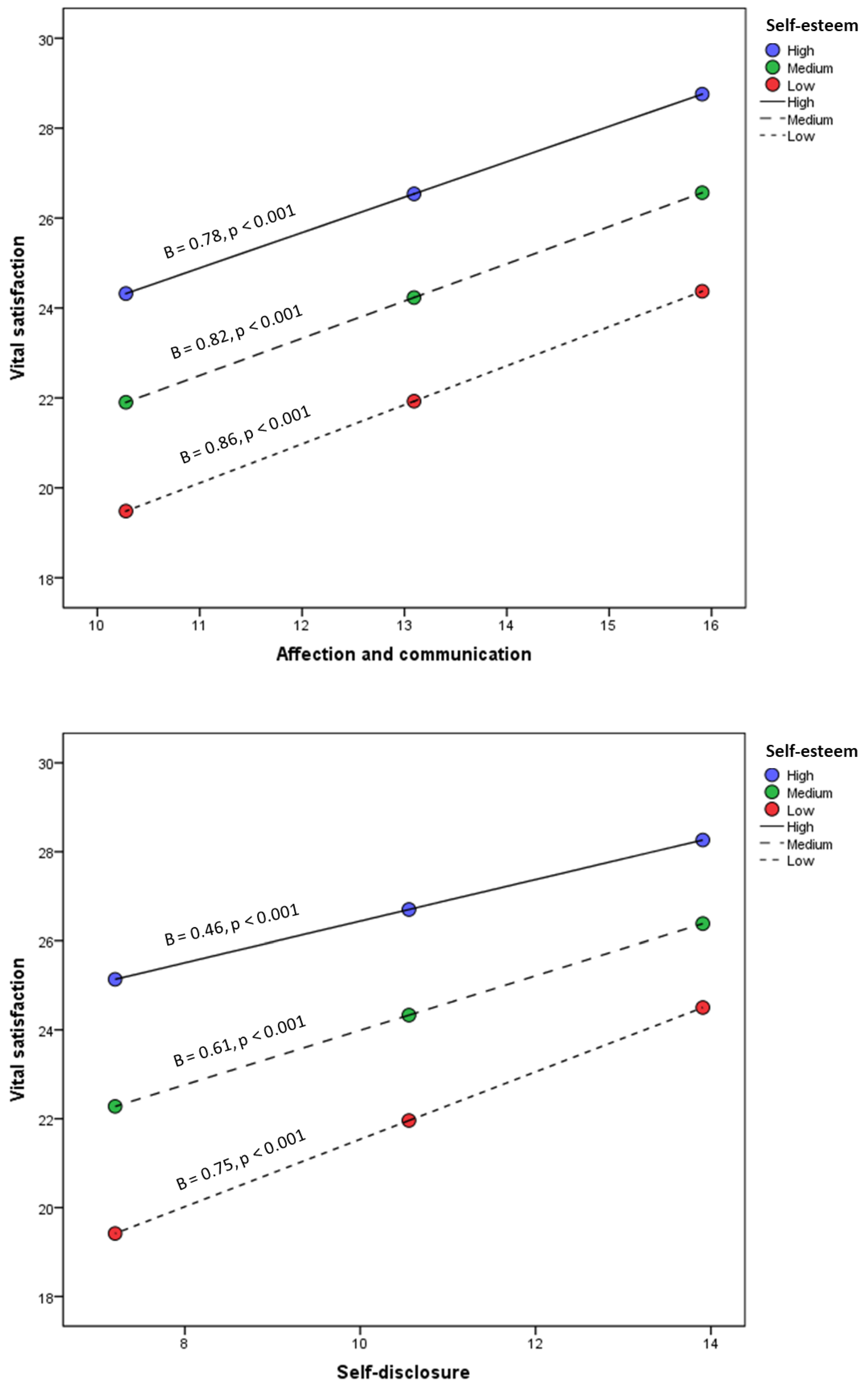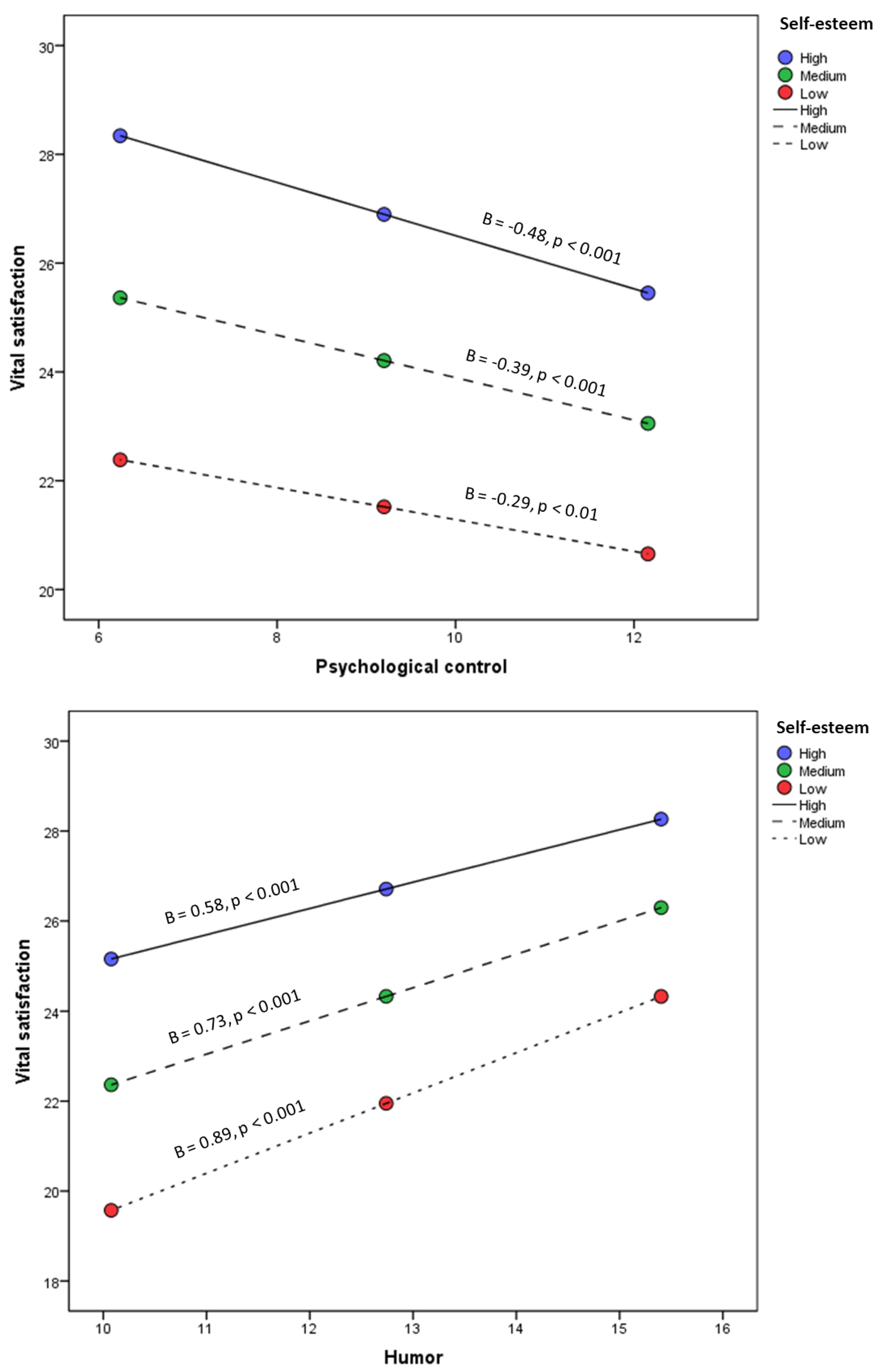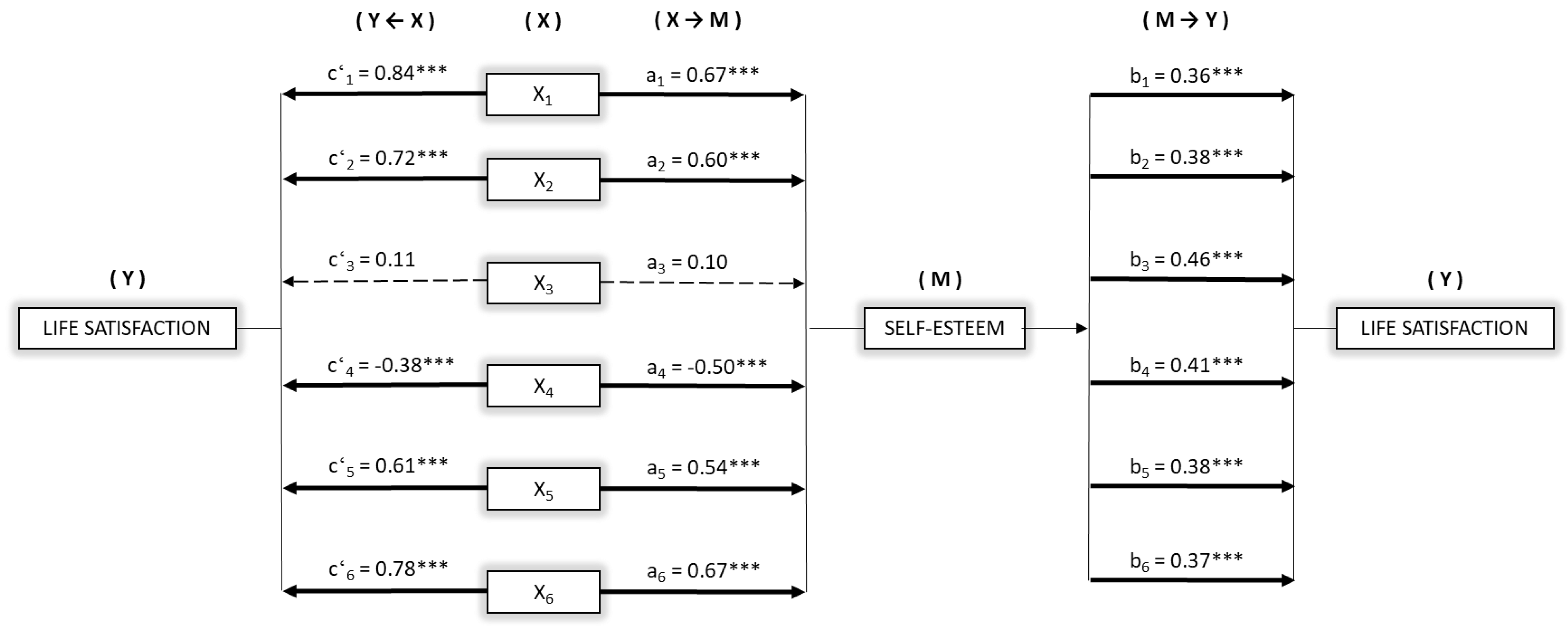Parenting Practices, Life Satisfaction, and the Role of Self-Esteem in Adolescents
Abstract
1. Introduction
1.1. Adolescent Life Satisfaction
1.2. Adolescent Self-Esteem
1.3. Parenting Practices, Self-Esteem, and Life Satisfaction in Adolescence
2. Materials and Methods
2.1. Participants
2.2. Instruments
2.3. Procedure
2.4. Data Analysis
3. Results
3.1. Parenting Practices, Self-Esteem, and Life Satisfaction: Correlations and Descriptive Statistics
3.2. Parenting Practices as Predictors of Adolescent Life Satisfaction
3.3. Moderating Effect of Self-Esteem on the Predictive Value of Parenting Practices for Life Satisfaction
3.4. Mediation Analysis of Self-Esteem on the Relationship between Parenting Practices and Life Satisfaction
4. Discussion
5. Conclusions
Author Contributions
Funding
Acknowledgments
Conflicts of Interest
References
- Fuentes, M.C.; García, F.; Gracia, E.; Alarcón, A. Los estilos parentales de socialización y el ajuste psicológico. Un estudio con adolescentes españoles. Rev. Psicodidáct. 2015, 20, 117–138. [Google Scholar] [CrossRef]
- Moreno, D.; Estévez, E.; Murgui, S.; Musitu, G. Reputación social y violencia relacional en adolescentes: El rol de la soledad, la autoestima y la satisfacción vital. Psicothema 2009, 21, 537–542. [Google Scholar]
- Parra, A.; Oliva, A.; Sánchez-Queija, I. Evolución y determinantes de la autoestima durante los años adolescentes. Anu. Psicol. 2004, 35, 331–346. [Google Scholar]
- Reina, M.C.; Oliva, A.; Parra, Á. Percepciones de autoevaluación: Autoestima, autoeficacia y satisfacción vital en la adolescencia. Psychol. Soc. Educ. 2010, 2, 55–69. [Google Scholar] [CrossRef]
- Riquelme, M.; García, O.F.; Serra, E. Desajuste psicosocial en la adolescencia: Socialización parental, autoestima y uso de sustancias. An. Psicol. 2018, 34, 536–544. [Google Scholar] [CrossRef]
- Rosa-Alcázar, A.I.; Parada-Navas, J.L.; Rosa-Alcázar, Á. Síntomas psicopatológicos en adolescentes españoles: Relación con los estilos parentales percibidos y la autoestima. An. Psicol. 2014, 30, 133–142. [Google Scholar] [CrossRef][Green Version]
- Ruiz-Hernández, J.A.; Moral-Zafra, E.; Llor-Esteban, B.; Jiménez-Barbero, J.A. Influence of parental styles and other psychosocial variables on the development of externalizing behaviors in adolescents: A sytematic review. Eur. J. Psychol. Appl. Legal. Context 2018, 11, 9–21. [Google Scholar] [CrossRef]
- Molero, M.M.; Pérez-Fuentes, M.C.; Barragán, A.B.; del Pino, R.M.; Gázquez, J.J. Analysis of the Relationship between Emotional Intelligence, Resilience, and Family Functioning in Adolescents’ Sustainable Use of Alcohol and Tobacco. Sustainability 2019, 11, 2954. [Google Scholar] [CrossRef]
- Pérez-Fuentes, M.C.; Molero, M.M.; Barragán, A.B.; Gázquez, J.J. Family functioning, emotional intelligence, and values: Analysis of the relationship with aggressive behavior in adolescents. Int. J. Environ. Res. Public Health 2019, 16, 478. [Google Scholar] [CrossRef]
- Diener, E.; Emmons, R.A.; Larsen, R.J.; Griffin, S. The satisfaction with life scale. J. Pers. Assess. 1985, 49, 71–75. [Google Scholar] [CrossRef]
- Cuadra, H.; Florenzano, R. El bienestar subjetivo: Hacia una psicología positiva. Rev. Psicol. 2003, 12, 83–96. [Google Scholar] [CrossRef]
- Diener, E.; Suh, E.; Lucas, R.; Smith, H. Subjetive well-being: Three decades of progress. Psychol. Bull. 1999, 125, 276–302. [Google Scholar] [CrossRef]
- Fleche, S.; Smith, C.; Sorsa, P. Exploring Determinants of Subjective Wellbeing in OECD Countries: Evidence from the World Value Survey; OECD Statistics Working Papers; Organization for Economic Co-Operation and Development: Paris, France, 2012. [Google Scholar] [CrossRef]
- Teismann, T.; Forkmann, T.; Brailovskaia, J.; Siegmann, P.; Glaesmer, H.; Margraf, J. Positive mental health moderates the association between depression and suicide ideation: A longitudinal study. Int. J. Clin. Health Psychol. 2018, 18, 1–7. [Google Scholar] [CrossRef] [PubMed]
- Diener, E. Guidelines for national indicators of subjective well-being and ill-being. Appl. Res. Qual. Life 2006, 1, 151–157. [Google Scholar] [CrossRef]
- Brown, J.L.; Macdonald, R.; Mitchell, R. Are people who participate in cultural activities more satisfied with life? Soc. Indic. Res. 2015, 122, 135–146. [Google Scholar] [CrossRef]
- Hansen, E.; Sund, E.; Knudtsen, M.S.; Krokstad, S.; Holmen, T.L. Cultural activity participation and associations with self-perceived health, life-satisfaction and mental health: The Young HUNT Study, Norway. BMC Public Health 2015, 15, 2–8. [Google Scholar] [CrossRef]
- Liu, H.; Yu, B. Serious leisure, leisure satisfaction and subjective well-being of chinese university students. Soc. Indic. Res. 2015, 122, 159–174. [Google Scholar] [CrossRef]
- Sarriera, J.C.; Paradiso, A.C.; Abs, D.; Soares, D.H.P.; Silva, C.L.; Fiuza, P.J. O bem-estar pessoal dos adolescentes a través do seu tempo libre. Estud. Psicol. 2013, 18, 285–295. [Google Scholar] [CrossRef]
- Shin, K.; You, S. Leisure type, leisure satisfaction and adolescents’ psychological wellbeing. J. Pac. Rim. Psychol. 2013, 7, 53–62. [Google Scholar] [CrossRef]
- Christoph, B.; Noll, H. Subjective well-being in the European Union during the 90 s. Soc. Indic. Res. 2003, 64, 521–546. [Google Scholar] [CrossRef]
- Videra-García, A.; Reigal-Garrido, R.E. Autoconcepto físico, percepción de salud y satisfacción vital en una muestra de adolescentes. An. Psicol. 2013, 29, 141–147. [Google Scholar] [CrossRef]
- Sun, R.C.; Shek, D.T. Positive youth development, life satisfaction and problem behaviour among Chinese adolescents in Hong Kong: A replication. Soc. Indic. Res. 2012, 105, 541–559. [Google Scholar] [CrossRef] [PubMed]
- Cohn, M.A.; Fredrickson, B.L.; Brown, S.L.; Mikels, J.A.; Conway, A.M. Happiness unpacked: Positive emotions increase life satisfaction by building resilience. Emotion 2009, 9, 361–368. [Google Scholar] [CrossRef] [PubMed]
- Quevedo-Aguado, M.P.; Benavente, M.H. Análisis de Variables de personalidad, bienestar psicológico y pensamiento constructivo en estudiantes de Ciencias de la Salud. Eur. J. Health Res. 2018, 4, 5–18. [Google Scholar] [CrossRef]
- Wechsler, S.M.; Benson, N.; de Lara, W.D.L.W.; Bachert, C.M.D.A.; Gums, E.F. Estilos de temperamento de adultos: Un análisis de redes de sus relaciones con el modelo de cinco grandes factores de personalidad. Eur. J. Educ. Psychol. 2008, 11, 61–75. [Google Scholar] [CrossRef]
- Chavarría, M.P.; Barra, E. Satisfacción vital en adolescentes: Relación con la autoeficacia y el apoyo social percibido. Ter. Psicol. 2014, 32, 41–46. [Google Scholar] [CrossRef]
- San Martín, J.L.; Barra, E. Autoestima, apoyo social y satisfacción vital en adolescentes. Ter. Psicol. 2013, 31, 287–291. [Google Scholar] [CrossRef]
- Cerezo, F.; Ruiz-Esteban, C.; Lacasa, C.S.; Gonzalo, J.J.A. Dimensions of parenting styles, social climate, and bullying victims in primary and secondary education. Psicothema 2018, 30, 59–65. [Google Scholar]
- Gázquez, J.J.; Pérez-Fuentes, M.C.; Molero, M.M.; Martín, A.B.; Sánchez-Marchán, C. Drug use in adolescents in relation to social support and reactive and proactive aggressive behavior. Psicothema 2016, 28, 318–322. [Google Scholar]
- Povedano, A.; Hendry, L.B.; Ramos, M.J.; Varela, R. Victimización escolar: Clima familiar, autoestima y satisfacción con la vida desde una perspectiva de género. Psychosoc. Interv. 2011, 20, 5–12. [Google Scholar] [CrossRef][Green Version]
- Coopersmith, S. The Antecedents of Self-Esteem; W. H. Freeman & Company: San Francisco, CA, USA, 1967. [Google Scholar]
- Rosenberg, M. Society and the Adolescent Self-Image; Princeton University Press: Princeton, NJ, USA, 1965. [Google Scholar]
- Harter, S. Causes and consequences of low self-esteem in children and adolescents. In Self-Esteem; Springer: Boston, MA, USA, 1993; pp. 87–116. [Google Scholar]
- Seligman, M. Positive Psychology: Fundamental Assumptions. Psychologist 2003, 16, 126–127. [Google Scholar]
- Acosta, F.P.; Clavero, F.H. Ansiedad y felicidad como estados emocionales contrapuestos en la infancia. Eur. J. Investig. Health Psychol. Educ. 2018, 8, 65–77. [Google Scholar] [CrossRef]
- Ferrel-Ortega, R.F.; Mendoza, V.; Ferrel-Ballestas, L.F. Factores psicológicos en adolescentes escolarizados con bajo rendimiento académico: Depresión y autoestima. Encuentros 2014, 12, 35–47. [Google Scholar] [CrossRef]
- Garaigordobil, M.; Durá, A. Relaciones del autoconcepto y la autoestima con la sociabilidad, estabilidad emocional y responsabilidad en adolescentes de 14 a 17 años. Anál. Modif. Conducta 2006, 32, 37–64. [Google Scholar]
- Erol, R.Y.; Orth, U. Self-esteem development from age 14 to 30 years: A longitudinal study. J. Pers. Soc. Psychol. 2011, 101, 607. [Google Scholar] [CrossRef]
- Baumrind, D. Authoritarian vs. authoritative parental control. Adolescence 1968, 3, 255–272. [Google Scholar]
- Maccoby, E.E.; Martin, J.A. Socialization in the context of the family: Parent-child interaction. In Handbook of Child Psychology: Vol. IV: Socialization, Personality and Social Development, 4th ed.; Hetherington, E.M., Mussen, P.H., Eds.; Wiley: New York, NY, USA, 1983; Volume 4, pp. 1–101. [Google Scholar]
- Oliva, A.; Parra, Á.; Sánchez-Queija, I.; López, F. Maternal and paternal educational styles: Evaluation and relationship with adolescent adjustment. An. Psicol. 2007, 23, 49–56. [Google Scholar]
- Álvarez-García, D.; García, T.; Barreiro-Collazo, A.; Dobarro, A.; Antúnez, Á. Parenting style dimensions as predictors of adolescent antisocial behavior. Front. Psychol. 2016, 7, 1383. [Google Scholar] [CrossRef]
- Peris, M.; Maganto, C.; Garaigordobil, M. Prácticas parentales y conductas internalizantes y externalizadas en niños y niñas de 2 a 5 años. Eur. J. Develop. Educ. Psychop. 2018, 6, 77–88. [Google Scholar]
- Grienenberger, J.; Kelly, K.; Slade, A. Maternal reflective functioning, mother-infant affective communication, and infant attachment: Exploring the link between mental states and observed caregiving behavior in the intergenerational transmission of attachment. Attach. Hum. Dev. 2005, 7, 299–311. [Google Scholar]
- Zhang, W.; Wei, X.; Ji, L.; Chen, L.; Deater-Deckard, K. Reconsidering parenting in Chinese culture: Subtypes, stability, and change of maternal parenting style during early adolescence. J. Youth Adolesc. 2017, 46, 1117–1136. [Google Scholar] [CrossRef] [PubMed]
- Cenkseven-Önder, F. Parenting styles and life satisfaction of Turkish adolescents. Educ. Res. Rev. 2012, 7, 577. [Google Scholar]
- De la Torre, M.J.; Casanova, P.F.; Carpio, M.V.; Cerezo, M.T. Parental consistency and inconsistency: Relationships with aggressive behavior and vital satisfaction of adolescents. Eur. J. Educ. Psychol. 2015, 6, 135–149. [Google Scholar] [CrossRef]
- Milevsky, A.; Schlechter, M.; Netter, S.; Keehn, D. Maternal and paternal parenting styles in adolescents: Associations with self-esteem, depression and life-satisfaction. J. Child. Fam. Stud. 2007, 16, 39–47. [Google Scholar] [CrossRef]
- Garcia, F.; Serra, E.; Garcia, O.F.; Martinez, I.; Cruise, E. A third emerging stage for the current digital society? Optimal parenting styles in Spain, the United States, Germany, and Brazil. Int. J. Environ. Res. Public Health 2019, 16, 2333. [Google Scholar] [CrossRef]
- Martínez, I.; Murgui, S.; García, O.F.; García, F. Parenting in the digital era: Protective and risk parenting styles for traditional bullying and cyberbullying victimization. Comput. Hum. Behav. 2019, 90, 84–92. [Google Scholar] [CrossRef]
- Stattin, H.; Persson, S.; Burk, W.J.; Kerr, M. Adolescents’ perceptions of the democratic functioning in their families. Eur. Psychol. 2011, 16, 32–42. [Google Scholar] [CrossRef]
- Gnambs, T.; Scharl, A.; Schroeders, U. The structure of the Rosenberg Self-Esteem Scale: A Cross-Cultural Meta-Analysis. Z. Psychol. 2018, 226, 14–29. [Google Scholar] [CrossRef]
- Schmitt, D.P.; Allik, J. Simultaneous administration of the Rosenberg Self-Esteem Scale in 53 nations: Exploring the universal and culture-specific features of global self-esteem. J. Pers. Soc. Psychol. 2005, 89, 623–642. [Google Scholar] [CrossRef]
- Atienza, F.L.; Pons, D.; Balaguer, I.; Merita, M.G. Propiedades psicométricas de la Escala de Satisfacción con la Vida en adolescentes. Psicothema 2000, 12, 314–319. [Google Scholar]
- Bedin, L.M.; Sarriera, J.C. Propriedades psicométricas das escalas de bem-estar: PWI, SWLS, BMSLSS e CAS. Avaliaçao Psicol. 2014, 13, 213–225. [Google Scholar]
- Cohen, J. Statistical Power Analysis for the Behavioral Sciences, 2nd ed.; Erlbaum: Hillsdale, NJ, USA, 1988. [Google Scholar]
- Hayes, A.F. Introduction to Mediation, Moderation, and Conditional Process Analysis: A Regression-Based Approach; The Guilford Press: New York, NY, USA, 2013. [Google Scholar]
- Belsley, D.A. A guide to using the collinearity diagnostics. Comput. Sci. Econ. Manag. 1991, 4, 33–50. [Google Scholar]
- Hair, J.F.; Anderson, R.E.; Tatham, R.L.; Black, W. Análisis Multivariante; Prentice Hall: Madrid, Spain, 1999. [Google Scholar]




| Se | Ls | Ac | Pa | Bc | Pc | Sd | Hu | |
|---|---|---|---|---|---|---|---|---|
| Self-esteem | ̶ | |||||||
| Life satisfaction | 0.43 *** | ̶ | ||||||
| Affection and communication | 0.30 *** | 0.44 *** | ̶ | |||||
| Promotion of autonomy | 0.26 *** | 0.38 *** | 0.67 *** | ̶ | ||||
| Behavioral control | 0.03 | 0.07 | 0.14 *** | 0.02 | ̶ | |||
| Psychological control | −0.23 *** | −0.23 *** | −0.31 *** | −0.42 *** | 0.29 *** | ̶ | ||
| Self-disclosure | 0.28 *** | 0.39 *** | 0.55 *** | 0.46 *** | 0.20 *** | −0.17 *** | ̶ | |
| Humor | 0.28 *** | 0.39 *** | 0.65 *** | 0.57 *** | 0.14 *** | −0.28 *** | 0.51 *** | ̶ |
| M | 30.49 | 24.17 | 13.06 | 12.80 | 12.85 | 9.20 | 10.50 | 12.69 |
| SD | 6.42 | 6.79 | 2.82 | 2.77 | 2.62 | 2.92 | 3.33 | 2.69 |
| Model | R | R2 | Corrected R2 | Change Statistics | Durbin Watson | ||||
|---|---|---|---|---|---|---|---|---|---|
| Standard Error of Estimation | Change in R2 | Change in F | Sig. of Change in F | ||||||
| 1 | 0.42 | 0.17 | 0.17 | 6.15 | 0.17 | 133.00 | 0.000 | 1.89 | |
| 2 | 0.45 | 0.20 | 0.20 | 6.05 | 0.03 | 22.88 | 0.000 | ||
| 3 | 0.47 | 0.22 | 0.21 | 6.00 | 0.01 | 10.04 | 0.002 | ||
| 4 | 0.48 | 0.23 | 0.22 | 5.97 | 0.01 | 7.59 | 0.006 | ||
| Model 4 | Unstandardized coefficients | Standardized coefficients | t | Sig. | Collinearity | ||||
| B | St. error | Beta | Tol. | VIF | |||||
| (Constant) | 11.92 | 1.80 | 6.61 | 0.000 | |||||
| Affect and communication | 0.49 | 0.12 | 0.20 | 3.99 | 0.000 | 0.49 | 2.02 | ||
| Self-disclosure | 0.35 | 0.08 | 0.17 | 4.02 | 0.000 | 0.65 | 1.52 | ||
| Psychological control | −0.25 | 0.08 | −0.10 | −2.87 | 0.004 | 0.87 | 1.13 | ||
| Humor | 0.34 | 0.12 | 0.13 | 2.75 | 0.006 | 0.53 | 1.85 | ||
© 2019 by the authors. Licensee MDPI, Basel, Switzerland. This article is an open access article distributed under the terms and conditions of the Creative Commons Attribution (CC BY) license (http://creativecommons.org/licenses/by/4.0/).
Share and Cite
Pérez-Fuentes, M.d.C.; Molero Jurado, M.d.M.; Gázquez Linares, J.J.; Oropesa Ruiz, N.F.; Simón Márquez, M.d.M.; Saracostti, M. Parenting Practices, Life Satisfaction, and the Role of Self-Esteem in Adolescents. Int. J. Environ. Res. Public Health 2019, 16, 4045. https://doi.org/10.3390/ijerph16204045
Pérez-Fuentes MdC, Molero Jurado MdM, Gázquez Linares JJ, Oropesa Ruiz NF, Simón Márquez MdM, Saracostti M. Parenting Practices, Life Satisfaction, and the Role of Self-Esteem in Adolescents. International Journal of Environmental Research and Public Health. 2019; 16(20):4045. https://doi.org/10.3390/ijerph16204045
Chicago/Turabian StylePérez-Fuentes, María del Carmen, María del Mar Molero Jurado, José Jesús Gázquez Linares, Nieves Fátima Oropesa Ruiz, María del Mar Simón Márquez, and Mahia Saracostti. 2019. "Parenting Practices, Life Satisfaction, and the Role of Self-Esteem in Adolescents" International Journal of Environmental Research and Public Health 16, no. 20: 4045. https://doi.org/10.3390/ijerph16204045
APA StylePérez-Fuentes, M. d. C., Molero Jurado, M. d. M., Gázquez Linares, J. J., Oropesa Ruiz, N. F., Simón Márquez, M. d. M., & Saracostti, M. (2019). Parenting Practices, Life Satisfaction, and the Role of Self-Esteem in Adolescents. International Journal of Environmental Research and Public Health, 16(20), 4045. https://doi.org/10.3390/ijerph16204045









